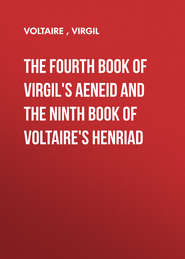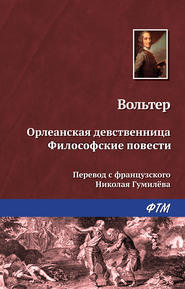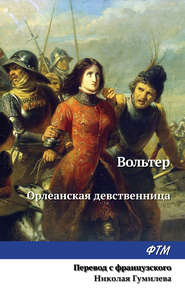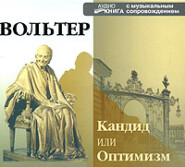По всем вопросам обращайтесь на: info@litportal.ru
(©) 2003-2024.
✖
A Philosophical Dictionary, Volume 03
Настройки чтения
Размер шрифта
Высота строк
Поля
Examine the situations of every people upon earth; they are in like manner founded on a train of occurrences seemingly without connection, but all connected. In this immense machine all is wheel, pulley, cord, or spring. It is the same in physical order. A wind blowing from the southern seas and the remotest parts of Africa brings with it a portion of the African atmosphere, which, falling in showers in the valleys of the Alps, fertilizes our lands; on the other hand our north wind carries our vapors among the negroes; we do good to Guinea, and Guinea to us. The chain extends from one end of the universe to the other.
But the truth of this principle seems to me to be strangely abused; for it is thence concluded that there is no atom, however small, the movement of which has not influenced the actual arrangement of the whole world; that the most trivial accident, whether among men or animals, is an essential link in the great chain of destiny.
Let us understand one another. Every effect evidently has its cause, ascending from cause to cause, into the abyss of eternity; but every cause has not its effect, going down to the end of ages. I grant that all events are produced one by another; if the past was pregnant with the present, the present is pregnant with the future; everything is begotten, but everything does not beget. It is a genealogical tree; every house, we know, ascends to Adam, but many of the family have died without issue.
The events of this world form a genealogical tree. It is indisputable that the inhabitants of Spain and Gaul are descended from Gomer, and the Russians from his younger brother Magog, for in how many great books is this genealogy to be found! It cannot then be denied that the grand Turk, who is also descended from Magog, is obliged to him for the good beating given him in 1769 by the Empress Catherine II. This occurrence is evidently linked with other great events; but whether Magog spat to the right or to the left near Mount Caucasus – made two or three circles in a well – or whether he lay on his right side or his left, I do not see that it could have much influence on present affairs.
It must be remembered, because it is proved by Newton, that nature is not a plenum, and that motion is not communicated by collision until it has made the tour of the universe. Throw a body of a certain density into water, you easily calculate that at the end of such a time the movement of this body, and that which it has given to the water, will cease; the motion will be lost and rest will be restored. So the motion produced by Magog in spitting into a well cannot have influenced what is now passing in Moldavia and Wallachia. Present events, then, are not the offspring of all past events, they have their direct lines, but with a thousand small collateral fines they have nothing to do. Once more be it observed that every being has a parent but every one has not an offspring.
CHANGES THAT HAVE OCCURRED IN THE GLOBE
When we have seen with our own eyes a mountain advancing into a plain – that is, an immense rock detached from that mountain, and covering the fields, an entire castle buried in the earth, or a swallowed-up river bursting from below, indubitable marks of an immense mass of water having once inundated a country now inhabited, and so many traces of other revolutions, we are even more disposed to believe in the great changes that have altered the face of the world than a Parisian lady who knows that the square in which her house stands was formerly a cultivated field, but a lady of Naples who has seen the ruins of Herculaneum underground is still less enthralled by the prejudice which leads us to believe that everything has always been as it now is.
Was there a great burning of the world in the time of Phaethon? Nothing is more likely, but this catastrophe was no more caused by the ambition of Phaethon or the anger of Jupiter the Thunderer than at Lisbon, in 1755, the Divine vengeance was drawn down, the subterraneous fires kindled, and half the city destroyed by the fires so often lighted there by the inquisition – besides, we know that Mequinez, Tetuan and considerable hordes of Arabs have been treated even worse than Lisbon, though they had no inquisition. The island of St. Domingo, entirely devastated not long ago, had no more displeased the Great Being than the island of Corsica; all is subject to eternal physical laws.
Sulphur, bitumen, nitre, and iron, enclosed within the bowels of the earth have overturned many a city, opened many a gulf, and we are constantly liable to these accidents attached to the way in which this globe is put together, just as, in many countries during winter, we are exposed to the attacks of famishing wolves and tigers. If fire, which Heraclitus believed to be the principle of all, has altered the face of a part of the earth, Thales's first principle, water, has operated as great changes.
One-half of America is still inundated by the ancient overflowings of the Maranon, Rio de la Plata, the St. Lawrence, the Mississippi, and all the rivers perpetually swelled by the eternal snows of the highest mountains in the world, stretching from one end of that continent to the other. These accumulated floods have almost everywhere produced vast marshes. The neighboring lands have become uninhabitable, and the earth, which the hands of man should have made fruitful, has produced only pestilence.
The same thing happened in China and in Egypt: a multitude of ages were necessary to dig canals and dry the lands. Add to these lengthened disasters the irruptions of the sea, the lands it has invaded and deserted, the islands it has detached from the continent and you will find that from east to west, from Japan to Mount Atlas, it has devastated more than eighty thousand square leagues.
The swallowing up of the island Atlantis from the ocean may, with as much reason, be considered historical, as fabulous. The shallowness of the Atlantic as far as the Canaries might be taken as a proof of this great event and the Canaries themselves for fragments of the island Atlantis.
Plato tells us in his "Timæus," that the Egyptian priests, among whom he had travelled, had in their possession ancient registers which certified that island's going under water. Plato says that this catastrophe happened nine thousand years before his time. No one will believe this chronology on Plato's word only, but neither can any one adduce against it any physical proof, nor even a historical testimony from any profane writer.
Pliny, in his third book, says that from time immemorial the people of the southern coasts of Spain believed that the sea had forced a passage between Calpe and Abila: "Indigenæ columnas Herculis vocant, creduntque per fossas exclusa antea admisisse maria, et rerum naturæ mutasse faciem."
An attentive traveller may convince himself by his own eyes that the Cyclades and the Sporades were once part of the continent of Greece, and especially that Sicily was once joined to Apulia. The two volcanos of Etna and Vesuvius having the same basis in the sea, the little gulf of Charybdis, the only deep part of that sea, the perfect resemblance of the two soils are incontrovertible testimonies. The floods of Deucalion and Ogyges are well known, and the fables founded upon this truth are still more the talk of all the West.
The ancients have mentioned several deluges in Asia. The one spoken of by Berosus happened (as he tells us) in Chaldæa, about four thousand three, or four hundred years before the Christian era, and Asia was as much inundated with fables about this deluge as it was by the overflowings of the Tigris and Euphrates, and all the rivers that fall into the Euxine.
It is true that such overflowings cannot cover the country with more than a few feet of water, but the consequent sterility, the washing away of houses, and the destruction of cattle are losses which it requires nearly a century to repair. We know how much they have cost Holland, more than the half of which has been lost since the year 1050. She is still obliged to maintain a daily conflict with the ever-threatening ocean. She has never employed so many soldiers in resisting her enemies as she employs laborers in continually defending her against the assaults of a sea always ready to swallow her.
The road from Egypt to Phœnicia, along the borders of Lake Serbo, was once quite practicable, but it has long ceased to be so; it is now nothing but a quicksand, moistened by stagnant water. In short, a great portion of the earth would be no other than a vast poisonous marsh inhabited by monsters, but for the assiduous labor of the human race.
We shall not here speak of the universal deluge of Noah. Let it suffice to read the Holy Scriptures with submission. Noah's flood was an incomprehensible miracle supernaturally worked by the justice and goodness of an ineffable Providence whose will it was to destroy the whole guilty human race and form a new and innocent race. If the new race was more wicked than the former, and became more criminal from age to age, from reformation to reformation, this is but another effect of the same Providence, of which it is impossible for us to fathom the depths, the inconceivable mysteries transmitted to the nations of the West for many ages, in the Latin translation of the Septuagint. We shall never enter these awful sanctuaries; our questions will be limited to simple nature.
CHARACTER
[From the Greek word signifying Impression, Engraving. – It is what nature has engraved in us.]
Can we change our character? Yes, if we change our body. A man born turbulent, violent, and inflexible, may, through falling in his old age into an apoplexy, become like a silly, weak, timid, puling child. His body is no longer the same, but so long as his nerves, his blood, and his marrow remain in the same state his disposition will not change any more than the instinct of a wolf or a polecat. The English author of "The Dispensary," a poem much superior to the Italian "Capitoli" and perhaps even to Boileau's "Lutrin", has, as it seems to me, well observed.
How matter, by the varied shape of pores,
Or idiots frames, or solemn senators.
The character is formed of our ideas and our feelings. Now it is quite clear that we neither give ourselves feelings nor ideas, therefore our character cannot depend on ourselves. If it did so depend, every one would be perfect. We cannot give ourselves tastes, nor talents, why, then, should we give ourselves qualities? When we do not reflect we think we are masters of all: when we reflect we find that we are masters of nothing.
If you would absolutely change a man's character purge him with diluents till he is dead. Charles XII., in his illness on the way to Bender, was no longer the same man; he was as tractable as a child. If I have a wry nose and cat's eyes I can hide them behind a mask, and can I do more with the character that nature has given me?
A man born violent and passionate presents himself before Francis I., king of France, to complain of a trespass. The countenance of the prince, the respectful behavior of the courtiers, the very place he is in make a powerful impression upon this man. He mechanically casts down his eyes, his rude voice is softened, he presents his petition with humility, you would think him as mild as (at that moment at least) the courtiers appear to be, among whom he is often disconcerted, but if Francis I. knows anything of physiognomy, he will easily discover in his eye, though downcast, glistening with a sullen fire, in the extended muscles of his face, in his fast-closed lips, that this man is not so mild as he is forced to appear. The same man follows him to Pavia, is taken prisoner along with him and thrown into the same dungeon at Madrid. The majesty of Francis I. no longer awes him as before, he becomes familiar with the object of his reverence. One day, pulling on the king's boots, and happening to pull them on ill, the king, soured by misfortune, grows angry, on which our man of courtesy wishes his majesty at the devil and throws his boots out the window.
Sixtus V. was by nature petulant, obstinate, haughty, impetuous, vindictive, arrogant. This character, however, seems to have been softened by the trials of his novitiate. But see him beginning to acquire some influence in his order; he flies into a passion against a guardian and knocks him down. Behold him an inquisitor at Venice, he exercises his office with insolence. Behold him cardinal; he is possessed della rabbia papale; this rage triumphs over his natural propensities; he buries his person and his character in obscurity and counterfeits humility and infirmity. He is elected pope, and the spring which policy had held back now acts with all the force of its long-restrained elasticity; he is the proudest and most despotic of sovereigns.
Naturam expellas furea, tamen usque recurret.
Howe'er expelled, nature will still return.
Religion and morality curb the strength of the disposition, but they cannot destroy it. The drunkard in a cloister, reduced to a quarter of a pint of cider each meal will never more get drunk, but he will always be fond of wine.
Age weakens the character; it is as an old tree producing only a few degenerate fruits, but always of the same nature, which is covered with knots and moss and becomes worm-eaten, but is ever the same, whether oak or pear tree. If we could change our character we could give ourselves one and become the master of nature. Can we give ourselves anything? do not we receive everything? To strive to animate the indolent man with persevering activity, to freeze with apathy the boiling blood of the impetuous, to inspire a taste for poetry into him who has neither taste nor ear were as futile as to attempt to give sight to one born blind. We perfect, we ameliorate, we conceal what nature has placed in us, but we place nothing there ourselves.
An agriculturist is told: "You have too many fish in this pond; they will not thrive, here are too many cattle in your meadows; they will want grass and grow lean." After this exhortation the pikes come and eat one-half this man's carps, the wolves one-half of his sheep, and the rest fatten. And will you applaud his economy? This countryman is yourself; one of your passions devours the rest and you think you have gained a triumph. Do we not almost all resemble the old general of ninety, who, having found some young officers behaving in a rather disorderly manner with some young women, said to them in anger: "Gentlemen, is this the example that I set you?"
CHARITY
CHARITABLE AND BENEFICENT INSTITUTIONS, ALMS-HOUSES, HOSPITALS, ETC
Cicero frequently speaks of universal charity, charitas humani generis; but it does not appear that the policy or the beneficence of the Romans ever induced them to establish charitable institutions, in which the indigent and the sick might be relieved at the expense of the public. There was a receptacle for strangers at the port of Ostia, called Xenodokium, St. Jerome renders this justice to the Romans. Almshouses seem to have been unknown in ancient Rome. A more noble usage prevailed – that of supplying the people with corn. There were in Rome three hundred and twenty-seven public granaries. This constant liberality precluded any need of alms-houses. They were strangers to necessity.
Neither was there any occasion among the Romans for founding charities. None exposed their own children. Those of slaves were taken care of by their masters. Childbirth was not deemed disgraceful to the daughters of citizens. The poorest families, maintained by the republic and afterwards by the emperors, saw the subsistence of their children secured.
The expression, "charitable establishment," maison de charité, implies a state of indigence among modern nations which the form of our governments has not been able to preclude.
The word "hospital," which recalls that of hospitality, reminds us of a virtue in high estimation among the Greeks, now no longer existing; but it also expresses a virtue far superior. There is a mighty difference between lodging, maintaining, and providing in sickness for all afflicted applicants whatever, and entertaining in your own house two or three travellers by whom you might claim a right to be entertained in return. Hospitality, after all, was but an exchange. Hospitals are monuments of beneficence.
It is true that the Greeks were acquainted with charitable institutions under the name of Xenodokia, for strangers, Nosocomeia, for the sick, and Ptokia, for the indigent. In Diogenes Laertius, concerning Bion, we find this passage: "He suffered much from the indigence of those who were charged with the care of the sick."
Hospitality among friends was called Idioxenia, and among strangers Proxenia. Hence, the person who received and entertained strangers in his house, in the name of the whole city, was called Proxenos. But this institution appears to have been exceedingly rare. At the present day there is scarcely a city in Europe without its hospitals. The Turks have them even for beasts, which seems to be carrying charity rather too far, it would be better to forget the beasts and think more about men.
This prodigious multitude of charitable establishments clearly proves a truth deserving of all our attention – that man is not so depraved as he is stated to be, and that, notwithstanding all his absurd opinions, notwithstanding all the horrors of war which transform him into a ferocious beast, we have reason to consider him as a creature naturally well disposed and kind, and who, like other animals, becomes vicious only in proportion as he is stung by provocation.
The misfortune is that he is provoked too often.
Modern Rome has almost as many charitable institutions as ancient Rome had triumphal arches and other monuments of conquest. The most considerable of them all is a bank which lends money at two per cent. upon pledge, and sells the property if the borrower does not redeem it by an appointed time. This establishment is called the Archiospedale, or chief hospital. It is said always to contain within its walls nearly two thousand sick, which would be about the fiftieth part of the population of Rome for this one house alone, without including the children brought up, and the pilgrims lodged there. Where are the computations which do not require abatement?
Has it not been actually published at Rome that the hospital of the Trinity had lodged and maintained for three days four hundred and forty thousand five hundred male and twenty-five thousand female pilgrims at the jubilee in 1600? Has not Misson himself told us that the hospital of the Annunciation at Naples possesses a rental of two millions in our money? (About four hundred thousand dollars.)
However, to return, perhaps a charitable establishment for pilgrims who are generally mere vagabonds, is rather an encouragement to idleness than an act of humanity. It is, however, a decisive evidence of humanity that Rome contains fifty charitable establishments including all descriptions. These beneficent institutions are quite as useful and respectable as the riches of some monasteries and chapels are useless and ridiculous.
To dispense food, clothing, medicine, and aid of every kind, to our brethren, is truly meritorious, but what need can a saint have of gold and diamonds? What benefit results to mankind from "our Lady of Loretto" possessing more gorgeous treasures than the Turkish sultan? Loretto is a house of vanity, and not of charity. London, reckoning its charity schools, has as many beneficent establishments as Rome.
The most beautiful monument of beneficence ever erected is the Hôtel des Invalides, founded by Louis XIV.
Of all hospitals, that in which the greatest number of indigent sick are daily received is the Hôtel Dieu of Paris. It frequently contains four or five thousand inmates at a time. It is at once the receptacle of all the dreadful ills to which mankind are subject and the temple of true virtue, which consists in relieving them.
It is impossible to avoid frequently drawing a contrast between a fête at Versailles or an opera at Paris, in which all the pleasures and all the splendors of life are combined with the most exquisite art, and a Hôtel Dieu, where all that is painful, all that is loathsome, and even death itself are accumulated in one mass of horror. Such is the composition of great cities! By an admirable policy pleasures and luxury are rendered subservient to misery and pain. The theatres of Paris pay on an average the yearly sum of a hundred thousand crowns to the hospital. It often happens in these charitable institutions that the inconveniences counterbalance the advantages. One proof of the abuses attached to them is that patients dread the very idea of being removed to them.
The Hôtel Dieu, for example, was formerly well situated, in the middle of the city, near the bishop's palace. The situation now is very bad, for the city has become overgrown; four or five patients are crowded into every bed, the victim of scurvy communicates it to his neighbor and in return receives from him smallpox, and a pestilential atmosphere spreads incurable disease and death, not only through the building destined to restore men to healthful life but through a great part of the city which surrounds it.















